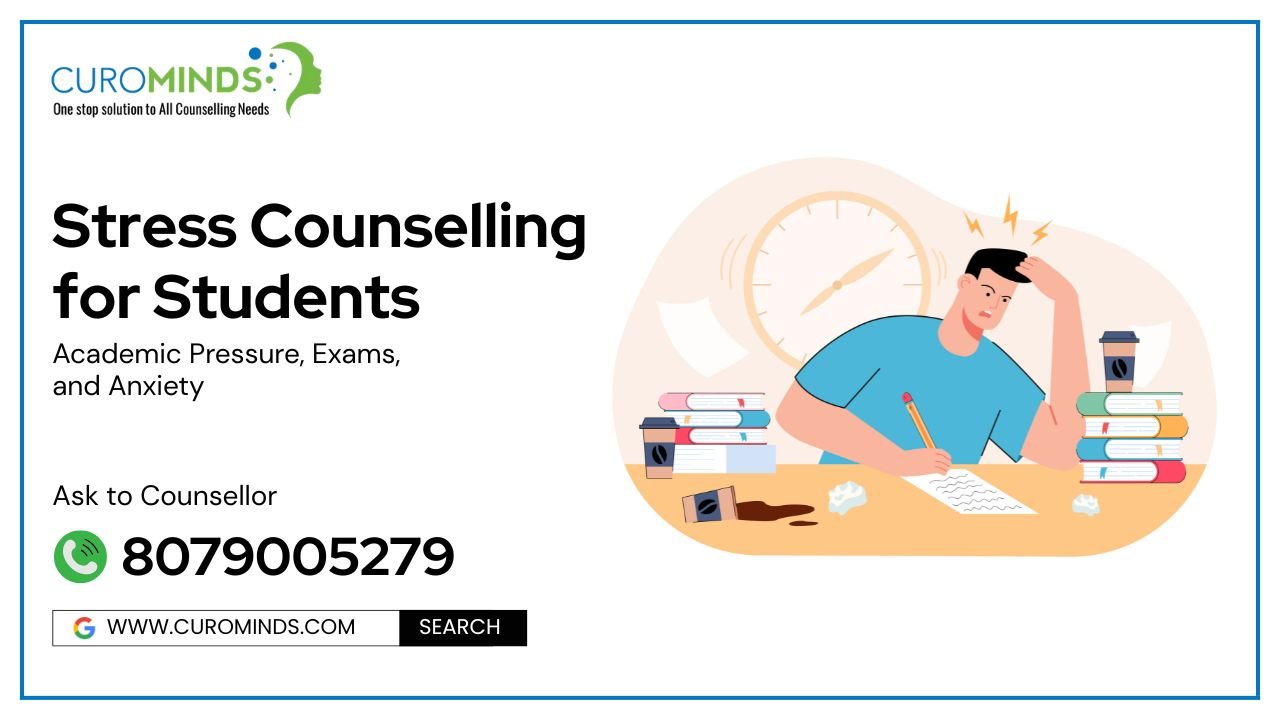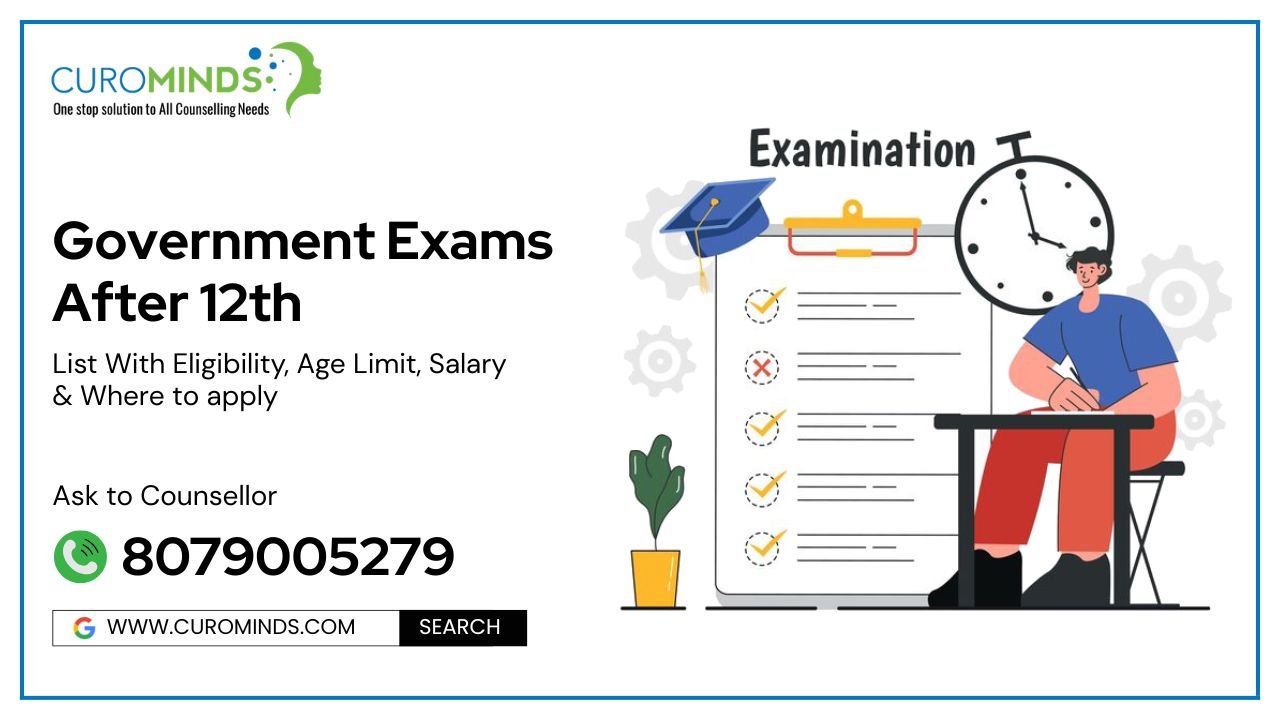Stress Counselling for Students: Academic Pressure, Exams, and Performance Anxiety
Estimated reading time: 10 minutes
Stress counselling for students helps them manage exam pressure, performance anxiety, and study overload by teaching practical tools like grounding exercises, focus routines, and panic-control techniques. It guides students to understand their stress triggers, build healthier study habits, and stay calm during tests so they can think clearly and perform without freezing.
Let’s be honest — students today aren’t just studying. They’re fighting a full-time psychological battle made of expectations, comparisons, and the “you must top because Sharma ji’s son did” Olympics.
And somehow everyone assumes they’ll magically “cope.”
That’s usually the point when they land in counselling.
I’ll walk you through what actually happens, why students crack under pressure, and what counselling does that motivational reels can’t.
I also wrote a more practical, everyday list of Stress Management Strategies if you want something students (and adults) can use outside exam season.
Stress Counselling for Students During Exams
Stress counselling for students during exams helps them break anxiety loops, manage pressure, and walk into tests without feeling like their brain is about to short-circuit.
When exams roll in, half the students suddenly discover headaches, fear, and the urge to run away from books like they’re radioactive. Counselling steps in to teach them how to calm the chaos, manage expectations, and stop assuming a bad grade equals a ruined life.
Why Students Are More Stressed Than They Admit
Most students pretend they’re fine. They’re not. Here’s what really pushes them over the edge:
- Fear of disappointing people: Half their stress comes from imagining their parents’ faces if they score less than 90.
- Competition that feels like a never-ending cricket match: Everyone’s running, but no one knows the score.
- Studying without a plan: They “study” for hours but don’t remember a single thing they read. Then panic. Then repeat.
- Comparing themselves to that one topper: The topper who probably cries into their pillow too.
- Exams designed like IQ obstacle courses: Let’s not pretend board exams are some calm, peaceful academic ritual.
Counselling starts with telling them: “No, you’re not weak. You’re just human.”
Why Exam Month Turns Students Into Stress
If you’ve never seen a student in the middle of exam season, it’s a special kind of meltdown:
- They sleep at 4AM and wake up at 7 like it’s normal.
- They highlight entire paragraphs because “everything is important.”
- They solve the same chapter five times because they’re scared of opening the next one.
- They cry over formulas they knew yesterday but forgot the moment they needed them.
By the time they reach counselling, they look like someone paused their brain and pressed panic mode.
This is exactly where stress counselling for students during exams helps — not by giving motivational quotes, but by teaching their nervous system to stop freaking out every ten minutes.
How Students Behave Right Before They Burn Out
You can spot it a mile away:
- They start snapping at everyone for no reason.
- They complain about stomach aches that mysteriously appear only during study time.
- They sit with books open but scroll Reels for two hours.
- They avoid talking about exams like it’s Voldemort.
- They keep saying “I’ll start tomorrow,” but tomorrow never comes.
This is textbook academic stress. And yes, it’s fixable.
Strange but Real Signs a Student Is Quietly Falling Apart
You think stress only looks like crying? Try these:
- arranging pens in straight lines for 20 minutes
- reading the same sentence 15 times
- staring at books without blinking
- eating weirdly (too much, too little, or only junk)
- avoiding any conversation about exams
- sudden stomach aches 30 minutes before studying
These signs of exam stress in students get ignored until the breakdown arrives.
If you want to understand what kind of stress your kid is actually dealing with, I’ve broken it down clearly here — Types of Stress.
What Actually Happens in Stress Counselling
Let me be very clear — counselling is not me handing out cute quotes like “You’re doing great!”
It’s more like:
- “Okay, why do you panic during tests?”
- “Show me your actual study routine… oh, you don’t have one? That explains a lot.”
- “Let’s figure out why you think you’re failing even before you start.”
Then we unpack the mess.
Here’s what students learn:
- How their brain reacts to pressure
Once they understand why their heart races or why thoughts freeze, half the fear loosens its grip.
- How to build study habits that don’t cause chaos
Not 6-hour study marathons. Just focused, realistic routines that don’t require superpowers.
- How to break the exam panic loop
Counsellors teach simple tricks that shut down overthinking:
- breathing resets
- grounding tricks
- “pause-and-reset” drills
Not fancy stuff, just practical tools.
- How to stop being scared of failing
Most anxiety comes from imaginary disasters. We unpack those, shred them, and replace them with something the brain can handle.
I’ve already written about the basics of Counselling for Stress, and everything in this student article builds on that foundation.
The Students Who Need Counselling the Most
You’ll recognize them instantly:
- the ones who cry quietly at night
- the ones who look “lazy” but are actually overwhelmed
- the toppers who smile in class and break down behind closed doors
- the ones who keep saying “I can’t” even though they’ve never actually tried
These students don’t need punishment.
They need someone who knows how stress plays tricks on the mind.
How Counselling Helps Students with Performance Anxiety
Counselling helps students with performance anxiety by rewiring fear responses, teaching emotional regulation, and giving them tools to stay calm during high-pressure moments.
The goal isn’t to eliminate fear.
It’s to stop fear from running the whole show.
What Students Can Actually Do to Feel Better
No nonsense. Just simple, counsellor-backed habits:
- Study in small chunks. The brain isn’t built for torture.
- Stop studying at 1 AM. You’re not doing PhD research.
- Pick one thing a day. Not twenty.
- Stop comparing yourself to the kid who studied since kindergarten.
- Speak up when things feel heavy. Stress grows in silence.
Tiny changes. Big relief.
The Bottom Line
Stress counselling isn’t about fixing “weak” students. It’s about teaching them how to manage pressure, focus under chaos, and stop letting fear dictate their performance.
Stress counselling doesn’t turn them into toppers — it helps them think clearly, study smarter, and walk into exams without feeling like the world might end.
If there’s one message every student needs to hear, it’s this: You don’t need to fight your battles alone. You just need the right coach in your corner.
FAQs
It’s a guided process where a counsellor helps students understand why their brain is short-circuiting under pressure and teaches practical ways to manage academic stress, exam fear, and performance anxiety.
It calms the panic, gives them grounding techniques, fixes unhealthy study habits, and helps them think clearly instead of freezing the moment they open the question paper.
Because they’re juggling expectations from teachers, parents, peers, and themselves — all while trying to remember chapters they barely had time to learn.
When stress turns into physical symptoms, study avoidance, panic attacks, sudden loss of confidence, or when exams feel impossible no matter how much they study.
Real talk, not lectures. They unpack what’s stressing them, learn coping tools, fix their routine, and break anxiety loops that keep derailing their focus.
Yes. Students learn how to stop overthinking, calm their body, and regain focus so they don’t blank out during the exam.
Re-reading the same line 20 times, irritability, stomach aches, crying spells, panic before tests, avoiding books, or suddenly “organizing everything” instead of studying.
They help students identify the trigger, slow the body’s stress reaction, and practice mental resets so they don’t freeze mid-exam.













